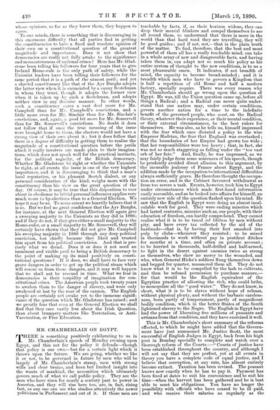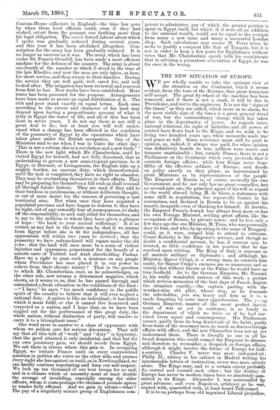MR. CHAMBERLAIN ON EGYPT. T HERE is something positively exhilarating to
us in Mr. Chamberlain's speech of Monday evening upon Egypt, and this not for the policy it defends—though that policy is our own—but for a certain light which it throws upon the future. We are going, whether we like it or not, to be governed in future by men who will be largely of Mr. Chamberlain's stamp, men with strong wills and clear brains, and keen but limited insight into the wants of mankind, the necessities which ultimately govern much of what we call public policy. They are the men who have risen for nearly a century past to power in America, and they will rise here too, are, in fact, rising fast, as any one can 'see who studies attentively the newer -politicians in Parliament and out of it. If those men are teachable by facts, if, as their horizon widens, they can drop their mental blinkers and compel themselves to see all round them, to understand that there is more in the world than that hard road they are travelling, they will be good guides ; and if not, not,—that is the plain truth of the matter. To find, therefore, that the best and most powerful of them all has a really teachable mind, can take in a whole array of new and disagreeable facts, and having taken them in, can adapt not so much his policy as his entire system of thought to the new conditions, is to us a most pleasurable omen. It indicates, if not breadth of mind, the capacity to become broad-minded ; and it is breadth which men who have to govern a Kingdom that is half a repetition of old Rome and half a modern factory, specially require. There was every reason why Mr. Chamberlain should go wrong upon the question of Egypt. He was, till the Union question came up, before all things a Radical ; and a Radical can never quite under- stand that one nation may, under certain conditions, govern another nation for a time to the indefinite benefit of the governed people, who must, on the Radical theory, whatever their experience, or their mental condition, or their external circumstances, be the best rulers for themselves. He was also, as he tells us, himself impressed with the fear which once dictated a policy to the wise Emperor Hadrian, the fear that England was overtasked ; that the boundaries of her Empire had grown too wide ; that her responsibilities were too heavy ; that, in fact, she was not so much staggering as falling under the " too vast orb of her fate." And, finally, he was impressed, as we may fairly judge from some sentences of his speech, though he prudently avoided direct allusion to this argument, by the incurable jealousy of France about Egypt, and the addition made by the occupation to international difficulties always sufficiently grave. He therefore thought the occupa- tion an error, and in the Cabinet favoured withdrawal as from too severe a task. Events, howeier, took him to Egypt under circumstances which made first-hand information easily accessible, and as he looked into affairs for himself, an entirely new side of the question flashed upon his mind. He saw that the English in Egypt were doing an almost incal- culable work for good. They were ending miseries which had lasted centuries, miseries such as, our people, with their education of freedom, can hardly comprehend. They cannot realise what it is to be taxed ad libitum by men without pity, and have every tax collected by the aid of the bastinado—that is, by having their feet smashed into pulp by clubs—whenever they resisted ; to be seized in thousands to work without pay in pestilent ditches for months at a time, and often on private account ; to be hurried in thousands, half-drilled and half-armed, to fight in the desert against enemies twice as strong as themselves, who show no mercy to the wounded, and who, when General Hicks's soldiers flung themselves down and begged for quarter, massacred them all. They do not know what it is to be compelled by the lash to cultivate, and then be refused permission to purchase manure,— for that would be the English equivalent of the Egyptian practice of allowing the rich, who could bribe, to monopolise all the " good water." They do not know, in short, what it is to be slaves without hope of release, without physical plenty, and without the barbaric careless- ness, born partly of temperament, partly of magnificent bodily condition, which in the better States of the South lightened slavery to the Negro. The English in Egypt have had the power of liberating five millions of peasants and artisans from that condition, and they have exercised it well.
This is Mr. Chamberlain's short summary of the reforms effected, to which he might have added that the Govern- ment have just summoned Mr. Justice Scott, the most successful of English Judges in Egypt, back from his high post in Bombay specially to complete and watch over a thorough reform of the Courts :—" Courts of justice have been established throughout the country, and although I will not say that they are perfect, yet at all events in theory you have a complete code of equal justice, and I believe that corruption, at any rate, has almost entirely become extinct. Taxation has been revised. The peasant knows now exactly when he has to pay it. Payment has been fixed at dates to suit his convenience and to suit his time—when the harvest has been gathered and he is best able to meet his obligations. You have no longer the possibility with officials who have ceased to be- ill paid, and who receive their salaries as regularly as the Custom-House collectors in England—the time has gone by when these local officials could, even if they had wished, extort from the peasant one farthing more than his legal obligation. The corn& forced labour about which I spoke was gradually reduced during several years, and this year it has been abolished altogether. Con- scription for the army has been gradually reduced. It is no longer as onerous as it was. The army, which has been under Sir Francis Grenfell, has been made a most efficient machine for the defence of the country. The army is about one-fourth of the number at which it stood in the time of the late Khedive, and now the men are only taken, as here, for short service, and then return to their families. During the service they are well paid, well cared for, and well looked after. The irrigation has been reviewed and renewed from first to last. New works have been established. More water has been procured for the purpose. Arrangements have been made to secure an equal distribution of it. The rich and poor stand exactly on equal terms. Each man according to the extent and character of his land may depend upon having a proportionate amount of what is truly in Egypt the water of life, and all of this has been done in seven years. I do not say there is not still a great deal to do ; but at least you will well under- stand what a change has been effected in the condition of the peasantry of Egypt by the operations which have taken place under the British occupation. One of the Ministers said to me when I was in Cairo the other day : This is not a reform, this is a revolution and a new birth.' " There is the new light which Mr. Chamberlain, until he visited Egypt for himself, had not fully discerned, that in undertaking to govern a new semi-tropical province, be it Egypt, or Burmah, or Livingstonia, the .English take up a mighty burden, an onerous duty, which thenceforward, until the task is completed, they have no right to abandon. They may be overtasking themselves in their efforts. They may be preparing for themselves a fall such as shall resound all through future history. They are mad if they add to their burdens in carelessness, or without deliberate thought, or out of mere desire for the renown of governing a vast territorial area. But when once they have acquired a populated province and have begun to redeem it, they have no right, out of any cowardly fear of consequences, to shake off the responsibility, to -seek only relief for themselves, and to say to the millions to whom they have given a glimpse of hope : Go back to your ancient sufferings.' It is as certain as any fact in the future can be, that if we retreat from Egypt before she is fit for independence, all her oppressions will within two years be revived ; that the peasantry we have enfranchised will repass under the old yoke ; that the land will once more be a scene of violent injustice and oppression, perpetrated for the benefit of .a minute caste of Turkish and Arab slaveholding Pashas. Have we a right to pass such a sentence on any people whom Providence has once placed it in our power to relieve from their chronic misery ? That is the question to which Mr. Chamberlain, once, as he acknowledges, on the other side, now returns a determined negative, which -shows, as it seems to us, that he has passed through and assimilated a fresh education in the conditions of the East : —" I have," he says, " too much confidence in the public spirit of the country to believe that it will ever neglect a national duty. A nation is like an individual ; it has duties which it must fulfil, or else it cannot live honoured and respected as a nation, and I hope that, as we have been singled out for the ,performance of this .great duty, the whole nation, without distinction of party, will resolve to carry it to a triumphant issue." One word more in answer to a class of opponents with whom we seldom care for serious discussion. They will say that all this talk of " work " and " duty" is hypocrisy, that the good. attained is only incidental, and that but for our own pecuniary gain, we should recede from Egypt. We ask them in return where this gain is. In occupying Egypt, we irritate France until on every controverted question in politics she votes on the other side, and presses every right she has against us until, as in. Newfoundland, we can hardly continue negotiatingand keep our self-respect. We lock up ten thousand of our best troops for no end, and in a climate which of necessity must at least double the average of invaliding, especially among the older officers, whom it costs perhaps two thousand- pounds apiece to Tender fully efficient. And we gain in return—what ? The pay of a singularly minute group of Englishmen com- petent to administer, pay of which the greater portion is spent in Egypt itself, but which, if it were all an addition to the national wealth, would not be equal to the receipts from many a new mine and many a successful London shop. Such calculations may amuse M. Ferry when he seeks to justify a conquest like that of Tonquin, but it is not in order to keep a few posts for Englishmen without votes that Mr. Chamberlain openly tells his constituents that in advising a premature evacuation of Egypt, he was for once in the wrong.







































 Previous page
Previous page